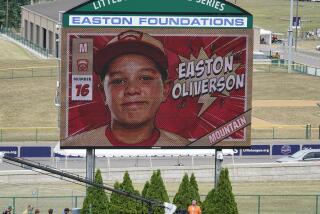Behind in the Count, Town Gets a Big Hit
- Share via
MOUNDS, Ill. — MOUNDS, Ill. -- Little League dad Gene Kennedy bursts into the hardware store. The town’s first game is about to start at the new ballpark, and the umpires have nothing to clean home plate with.
Store owner Craig Rose hands him a paintbrush, no charge.
People are chipping in any way they can for the new league and lighted diamond, which some expect will bring hope and summertime fun to a town where both are scarce.
“It’s going to give us a nice boost,” said Mike Khourie, who owns an auction house next to the store. “It’ll help the economy, the kids and the rest of us.”
The place could use some help. Mounds, in deep southern Illinois, was ranked by census figures among the poorest towns in the state.
Jobs on the nearby Ohio and Mississippi rivers, on the railroad and in the apple and peach orchards have dried up over the last half-century, sending many off to work elsewhere and leaving those behind with few options.
“Our enemies here are apathy, hopelessness and defeatism,” said Dan Prigge, who heads an economic development group in Pulaski County.
The county’s population has dropped by about half in the last 60 years, to 9,500.
The median income in Mounds, the county’s biggest town with 1,100 people, hovers around the federal poverty line of $17,000 a year for a family of four.
Many families either didn’t have the time or the money to make the 10-mile trip to Olmsted, where the closest Little League had been since the old school diamond closed in Mounds more than 20 years ago.
Kennedy, an avid baseball fan, wanted to bring the sport back to his hometown. When he and his friends hatched a plan last year to start the league, they thought they could get enough $600 sponsorships for one or two teams.
To their surprise, organizers found enough sponsors for 13 teams among the churches, businesses and other groups they canvassed. They’d found enough to sign up more than 200 boys and girls ages 3 to 18. Most are local; the rest are from Villa Ridge, Mound City and other nearby villages.
“People were starved for something positive,” said Kennedy, an insurance salesman who also coaches his son Brent’s team.
They also got help from the Southernmost Illinois Delta Empowerment Zone, which offers grants and loans from the U.S. Department of Agriculture to boost the regional economy and improve the quality of life.
The agency has distributed about $4 million for dozens of projects ranging from cleaning up vacant lots to converting an old school into a community center, said director Donna Raynalds.
It also paid the $55,000 bill for the new ballpark.
“We want to build communities, and when people start to see things change, success breeds success,” she said.
The city donated use of the land, which was previously an empty lot, and diverted its own empowerment-zone grant earmarked for sidewalks to the project.
“Sidewalks can wait,” said Mayor Grace Richards, a retired beautician. “But the kids need something to do this summer.”
Until now, about the only places for children to play in Mounds were a run-down basketball court and a small playground.
There are no summer day camps. The closest public swimming pool is 30 miles away, and many kids are reluctant to swim in the rivers. Too many snakes.
“Last summer I went fishing and hunting and took my pellet gun and busted out windows, mostly of abandoned cars, anything I could find,” 11-year-old Reuben Bellamy admitted.
These days, Reuben gets up early to play catch and prepare for his team’s daily 1 p.m. practice.
The bleachers quickly filled for the home opener at the nearly completed field, which has a cinderblock concession stand, dugouts, fenced backstop and a freshly painted infield. The city’s white water tower stands over center field, the town’s name emblazoned on it.
Before the first player took the batter’s box, more than 100 people crowded behind the backstop, most on lawn chairs they had brought from home. They let out a collective “Ah!” when the lights came on at dusk.
Somewhere on the home team’s side was the Isom family, who had come to watch 7-year-old Wyatt Isom play third base in his first Little League game.
Before the Mounds ballpark opened, Shavona and Bill Isom, who each work two jobs, had to tell Wyatt and his 10-year-old brother, Steven, that they couldn’t play baseball because neither parent could get them to practice and games that were far away.
“It was hard to say no because there was just nothing for them to do here,” said Shavona Isom, as she sat on her folding chair.
Bill Isom was standing near third base, where Wyatt was shifting his weight from his right foot to his left, looking bored. His team was losing.
Bill Isom didn’t care. He was taking pictures.
More to Read
Go beyond the scoreboard
Get the latest on L.A.'s teams in the daily Sports Report newsletter.
You may occasionally receive promotional content from the Los Angeles Times.










